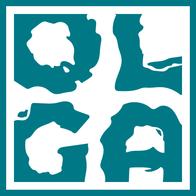Dear readers,

In this newsletter issue, we tell stories about agroforestry systems along small water streams and their ecological and economic benefits for regions. We present the results of vegetation mapping at two agroforestry test sites and report on the visit to the agricultural company NamNam Natura, who are fully committed to permaculture. We give space to the concerns of thematically related projects and initiatives: from research into the social impact of community-supported farming formats to a request for a farmer willing to establish an agroforestry strip on his land by a water course!
We hope you enjoy reading this issue and wish you a Merry Christmas!
Multifunctional ecosystem services and regional value creation through land use change
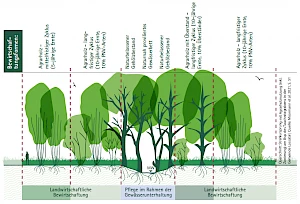
In OLGA, the functions of agroforestry structures along water courses are investigated with regard to improving the microclimate, promoting biodiversity and optimal wood biomass development. The value-added aspect of this agroforestry land use is the production of energy wood from poplars, willows or alders. The wood can be used for private and public heat supply on a wood chip basis. In Saxony, little agricultural wood is cultivated so far compared to other federal Länder. Communicating the advantages and economic effects of this land use is therefore more important than ever, especially against the backdrop of the current energy crisis and the federal goal of climate neutrality in 2045. In this article, the ecosystem services and the economic benefits of agricultural wood cultivation on running waters in Saxony are depicted.
It's all about the light!
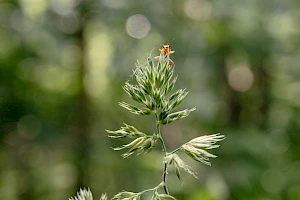
In the OLGA project, comprehensive vegetation surveys were carried out in and in the immediate vicinity of two agroforestry structures in 2021 and 2022. In the second part of the presentation of results, the focus is on the connection between light availability and species richness within the agroforestry systems.
We do permaculture farming for regional food systems
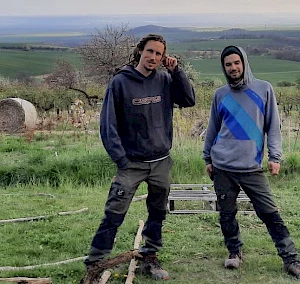
On a grey November day, I set off with Daniel and Markus from NamNam Natura to the Bohemian Low Mointain Range, where they have been managing a 3,000 square metre fruit forest system in permaculture for a good four years. For me, it will be an active day of practice combined with discussions ranging from the Common Agricultural Policy of the EU to permaculture and romance to the firmness of the North Bohemian clay soil.
What effects do community-based sustainable farming formats have on biodiversity, regional economy and social coexistence?
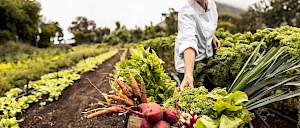
Since this year, the FONA strategy of the Federal Ministry of Education and Research, in which OLGA is also funded, has been enriched by a social-ecological research project. In the [pane] project, young scientists from the Technical University of Berlin and the Institute for Transformative Sustainability Research IASS in Potsdam are funded until 2027 to investigate the social, economic and ecological effects of participatory, sustainable food production (PNL). They are supported by the Berlin Museum für Naturkunde Leibniz Institute for Evolutionary and Biodiversity Research.
The project team, led by Dr. Katharina Beyerl, plans to accompany 15 initiatives in Eastern Germany that practise communal farming over a period of five years. Specifically, the effects of these initiatives on soil health and biodiversity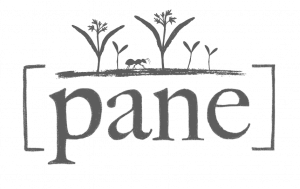 as well as on the people in the region and regional value creation in rural areas will be researched. The local people are actively involved. They can actively contribute their perspectives on sustainable regional development and also conduct their own observations on soil quality and biodiversity in order to document the effects of different vegetable cultivation practices.
as well as on the people in the region and regional value creation in rural areas will be researched. The local people are actively involved. They can actively contribute their perspectives on sustainable regional development and also conduct their own observations on soil quality and biodiversity in order to document the effects of different vegetable cultivation practices.
There are now a number of corresponding farming formats: solidarity farming, community gardens, tiny farms, rental gardens, etc. In the [pane] project, three such farms will be selected in each of Saxony, Saxony-Anhalt, Thuringia, Brandenburg and Mecklenburg-Western Pomerania and scientifically monitored over the next few years. The joint research process is accompanied by an advisory board with members from science, business, administration and politics. The aim of the project is to strengthen regional value chains through PNL initiatives and to promote regional development in structurally weak areas. A supra-regional strategy for strengthening the positive effects of PNL is being developed, which should also be transferable to other regional contexts.
The OLGA project in its practical phase 2023-25 will continuously exchange its results and activities with the [pane] project.
Agroforestry pioneers wanted for Dresden and the surrounding area!

The BUND Regional Group Dresden is carrying out the project Multifunctional Biotope Network (only German) until June 2023. An agroforestry strip is to be established at the edge of watercourses in the surrounding area of Dresden (neighbouring districts). For this measure, the project is still looking for a farmer who is interested in establishing a pilot site.
The agroforestry strip can cover approx. 1 ha. The planting costs will be financed by the project. In addition, agroforestry is eligible for funding under the new CAP from 2023. The agroforestry strip not only strengthens the biotope network, but also provides erosion protection and shade. In addition, the water quality is increased by the water shade and the strip acts as a biogenic land filter. In addition, the project aims to strengthen regional value chains, e. g. through the regional production and use of wood.
Th BUND Regional Group Dresden is cooperating in the project with the Institute for Applied Material Flow Management at Trier University of Applied Sciences. The institute's agricultural engineers have many years of experience in the establishment of agroforestry strips, including in the WERTvoll project (only German) in the Leipzig area and work closely together with the German Association for Agroforestry (DeFAF) e. V. (only German).
The design of the strips is flexible and can be individually adapted to the needs of the farmer and the land use.
Interested parties can contact Katrin Gruner or Frank Wagener.
Save the Date
06.01.2023, online | AgiL*-Sprechstunde: Innovative Lebesmittel more info
17.01.2023, online | Agroforst-Stammtisch: Das Apfelbaum-Agroforstsystem der Familie Große-Kleimann in der LEADER-Region Steinfurter Land more info
18.-21.01.2023, Berlin | Global Forum for Food and Agriculture: Food Systems Transformation - A Worldwide Response to Multiple Crises more info
19.01.2023, online | AgiL-Regionalmarketing-Akademie: Änderungen im Verpackungsgesetz - Chancen für Mehrweg more info
20.01.2023, Düren | Abschlusskonferenz Stadt-Land-Plus-Projekt DAZWISCHEN more info
20.-29.01.2023, Berlin | Internationale Grüne Woche more info
20.-21.01.2023, Berlin | "Wir haben es satt!" - Demonstration für eine Agrar- und Ernährungswende
25.-26.01.2023, Berlin/online | Zukunftsforum Ländliche Entwicklung more info
12.-13.06.2023, Bamberg | Stadt-Land-Plus Statuskonferenz
22.06.2023, Dresden | Sächsisches Gewässerforum
*Sächsische Agentur für regionale Lebensmittel
Imprint
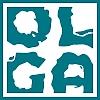
 This newsletter is published by the City of Dresden as the responsible partner for public relations in the OLGA project, which is funded by the Federal Ministry of Education and Research as part of the Stadt-Land-Plus programme.
This newsletter is published by the City of Dresden as the responsible partner for public relations in the OLGA project, which is funded by the Federal Ministry of Education and Research as part of the Stadt-Land-Plus programme.
City of Dresden
Mayor's Office
Dr.-Külz-Ring 19
01067 Dresden
Editor: Anke Hahn | Contact
With contributions by Dr. Katharina Beyerl, Jonna Perline Groth, Katrin Gruner, Michaela Hildebrand, Prof. Doris Krabel, Daniel Wetzler, Benjamin Zenke
If you have not yet subscribed to the newsletter, you can do so HERE.
If you no longer wish to receive the newsletter, you can unsubscribe HERE.
